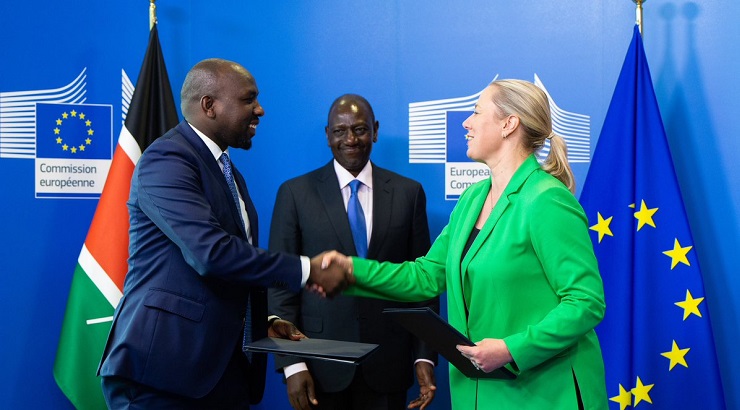Infrastructure
‘Team Europe’ to Build Sh47bn Green BRT in Nairobi
The Nairobi Core BRT 3 will feature zero emission electric buses.

Kenya and the European Commission have signed a Sh47 billion (€347.6 million) deal for the construction of East Africa’s first bus rapid transit (BRT) for electric buses.
The deal that was signed during President William Ruto’s tour of Belgium on March 29 will unlock funds for the construction of Nairobi Core Bus Rapid Transit Line 3 (BRT 3), which will be used by zero-emission electric buses as part of Kenya’s climate change mitigation plan.
The facility is expected to introduce an intelligent transport system, affordable fare setting, inclusion of access to the public transport system for youth, women, and low-income households, and innovative concepts to address commuter safety.
The deal, which was signed by Roads & Transport CS Kipchumba Murkomen and European Commissioner Jutta Urpilainen, will see a consortium of Team Europe partners injecting Sh38 billion (€281.3 million) into the project.
Public transport system
“By supporting the implementation of a safe, clean, high quality and efficient public transport system in Nairobi, Team Europe is the key partner in Kenya’s green transition,” the European Commission said in a statement.
Under the agreement, the European Union (EU) will provide Sh6.1 billion (€45 million) in grants, while the European Investment Bank (EIB) and the French Development Agency AFD will provide Sh32.1 billion (€236.3 million).
The Deutsche Gesellschaft für Internationale Zusammenarbeit (GIZ) GmbH will provide technical assistance to the project’s implementation on behalf of the German Federal Ministry for Economic Cooperation and Development and the EU.
The Government of Kenya will contribute Sh9 billion (€66.3 million).
“The EIB welcomes today’s milestone agreement with President Ruto and looks forward to finalizing €201 million support for the visionary Nairobi BRT scheme through EIB Global,” said Thomas Östros, Vice-President of the EIB.
Sustainable urban transport
According to Mr Östros, the funding represents the EIB’s largest-ever support for sustainable urban transport in East Africa and will enable millions of people living in Kenya’s capital to access safe and green transport for years to come.
RELATED: Nairobi Eyes Colombia BRT Model to Tackle Traffic Jam
The BRT Line 3 is a key deliverable of the Mombasa-Kisangani strategic corridors, which is a priority in the Global Gateway Africa-Europe Investment Package.
The line will be fully designed by European expertise with “a strong focus on the highest social and environmental standards”.
The Nairobi BRT Line 3 is expected to be operational in 2030 – moving up to 300,000 daily commuters more safely and efficiently.
Over the past 10 years, the EU has offered technical assistance to the Kenyan government on transportation matters.
One of the outcomes of this assistance is the creation of the Nairobi Metropolitan Transport Authority (NaMATA), which will run the BRT Line 3 with the EU.














